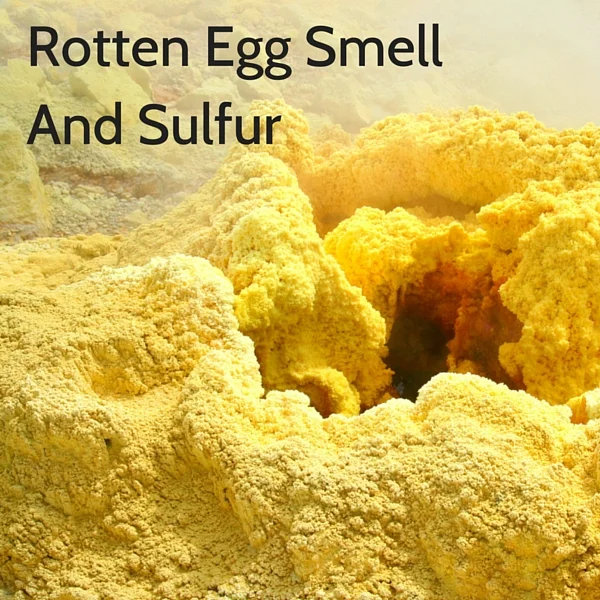Rotten egg smell and sulfites in water
It’s probably one of the most obnoxious water quality problems there is – getting a whiff of rotten eggs when you turn on the faucet or tasting rotten eggs when you take a sip of water.
This unpleasant smell is caused by the presence of hydrogen sulfide or sulfate in your water. Although it is usually not harmful to your health, this water quality problem can do more to your home than just make it a little smelly. Hydrogen sulfide makes water corrosive, which means it can damage a home’s metal plumbing elements, like copper, iron or steel pipes. It can tarnish silverware, copper and brass utensils, as well as leave yellow or black stains on your kitchen and bathroom fixtures.
Sulfates can cause a scale build-up in pipes and is sometimes said to make the water bitter. In some cases, the presence of sulfates can result in a dark slime that clogs pipes and stains clothing.
Where do hydrogen sulfide and sulfates come from?
When underground organic matter decays, it can chemically react with some sulfur-containing minerals in the soil and rock, creating hydrogen sulfide in the groundwater. Sulfate is a naturally occurring mineral in the soil and rock formations that is picked up by water as it flows through the ground. Certain types of bacteria called "sulfur bacteria" or "sulfate-reducing bacteria," can change sulfate and natural organic materials to hydrogen sulfide gas.
Water heaters can sometimes be the source of hydrogen sulfide gas if it uses a magnesium rod in the tank to prevent water heater corrosion. The magnesium in the rod chemically converts naturally occurring sulfates to hydrogen sulfide.
How do I know if it’s hydrogen sulfide or sulfate?
The rotten egg smell of hydrogen sulfide gas can be detected at very low levels, but your treatment options depend on the amount of hydrogen sulfide in the water, so testing is recommended. Massachusetts and New Hampshire both offer state testing for a small fee. However, because hydrogen sulfide is a gas released into the air once the water comes out of the faucet, testing can be tricky. Skillings & Sons recommends having us or another water systems professional conduct the test so that the results accurately reflect the amount of hydrogen sulfide in your water.
The test for sulfate is less tricky, but must be done carefully to avoid outside contamination. In some rare cases, the rotten egg smell can be caused by pollution, so we recommend taking another sample to rule out that cause.
Next is figuring out the source of the hydrogen sulfide or sulfate. Is the smell coming out of both of the hot and cold water faucets, or just one? Is the smell coming only from the water treated by your water softener? Does the smell eventually go away as you continue to run the water, or is it constant? Answering these questions will help pinpoint where the hydrogen sulfide or sulfate is coming from.
How can I remove rotten egg smell from my water?
If the source of the problem is a home well, flushing the casing with a strong chlorine solution can usually address the problem. If the problem is in the groundwater, though, flushing will only be a temporary fix. The same goes for your water softener. Replacing the magnesium rod or flushing the softener with a chloride solution or very hot water can help if the hydrogen sulfide came from there, but it is not a long term fix if came from the ground water.
If hydrogen sulfide originates from your groundwater, there are a number of options. For water with a minimal amount of hydrogen sulfide, an active carbon filter will solve the problem. If there is a moderate amount, an oxidizing filter will convert the hydrogen sulfide into sulfur, which can easily be filtered out. For high levels of hydrogen sulfide, you can install an oxidation-filtration system, which works similarly to an oxidizing filter. If the problem is sulfate in your water, it can easily be removed with a water softener.
Skillings & Sons has been helping homeowners address the different causes of “rotten egg” smelling water for decades. We can help you identify and fix the problem from testing to installation. Contact us today and start living without this water contamination.

